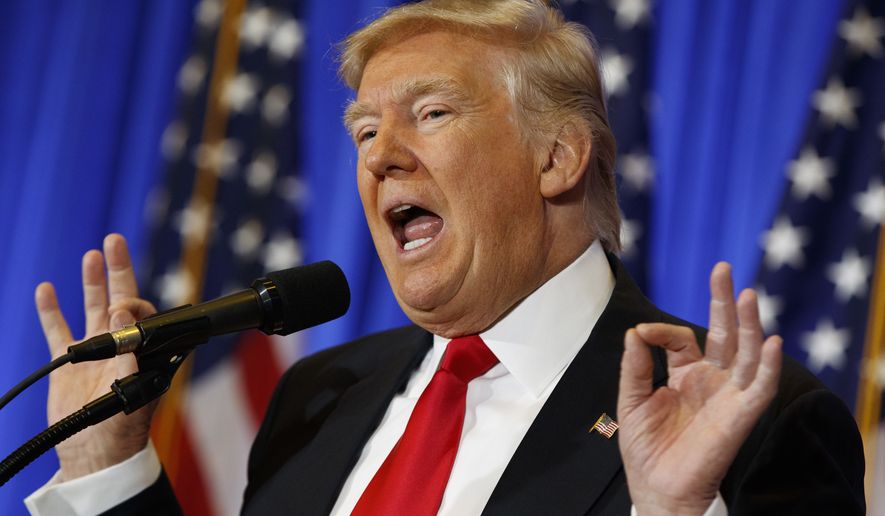OPINION:
Republicans moved quickly this week toward confirming President-elect Donald Trump’s Cabinet nominations, as widening cracks began appearing in some of his major campaign promises.
Let’s start with Mr. Trump’s biggest promise of all to build a 20-foot high wall along America’s 2,000-mile plus border with Mexico, falsely saying that the Mexicans would pay for it.
It turns out, of course, that Mexico isn’t going to cough up the money for this boondoggle, which they’ve told him to his face last year, and the whopping $20 billion price tag will be picked up in its entirety by hard-pressed American taxpayers.
Mr. Trump now insists that after the wall is built, if it is ever built, he will force the Mexican government to pay for it, through sky high “border taxes” on their exports, or some other scheme. Good luck with that.
All along, Mr. Trump has repeatedly insisted the wall would be built very quickly. But this week his nominee to head the Department of Homeland Security, retired Marine Gen. John F. Kelly, who would oversee the monumental project, told Congress that it might not “be built anytime soon.”
The reason, he said, was because of the immensity of the structure over almost impenetrable terrain, appearing to contradict Mr. Trump’s delusional remarks that it would be “easy” and could be “done inexpensively.” In his dreams.
Here’s how The Washington Post reported his testimony before the Senate Committee on Homeland Security and Government Affairs considering his nomination:
“Kelly appeared to play down the importance of Trump’s promised wall, telling senators that ’a physical barrier in and of itself will not do the job’ and that technology such as drones and sensors are also needed to secure the U.S.-Mexico border.”
Gen. Kelly also seemed to distance himself from some parts of Mr. Trump’s plan to deport 11 to 12 million illegal migrants — flatly saying he will “keep an open mind” on President Obama’s action to give temporary protection from deportation to hundreds of thousands of longtime residents who were brought to the U.S. as young children.
Gen. Kelly also raised questions about Mr. Trump’s suggestion during the campaign that he might propose an outright ban on Muslims entering the U.S.
“I don’t believe it is appropriate” to single out people, based solely on their religion or ethnic background, he told the committee.
On that very same day, Alabama Sen. Jeff Sessions, Mr. Trump’s nominee to be U.S. attorney general, was staking out positions before the Senate Judiciary Committee that many of Mr. Trump’s supporters, especially evangelical voters, would oppose.
He said he would abide by the Supreme Court’s ruling on abortion rights in Roe v. Wade as well as its 5-to-4 decision legalizing same-sex marriage. He also declared that waterboarding was “absolutely improper and illegal” and that even though he had voted against the law, he would uphold the ban as attorney general.
As for earlier investigations into Hillary Clinton’s use of an unsecured, private email system, an issue that Mr. Trump flogged against her in his “lock her up” campaign rallies, Mr. Sessions said he would recuse himself from any future Justice Department investigation into the email scandal.
“We can never have a political dispute turn into a criminal dispute,” he said.
Meantime, one of Mr. Trump’s chief economic proposals was being declared dead and buried on Capitol Hill: A plan to impose a 35 percent trade tariff on imports from Mexico, China and many of our other trading partners.
“We’re not going to be raising tariffs,” House Speaker Paul Ryan declared last week.
That drew strong approval and praise from the business community and free market conservatives, including the highly regarded Club for Growth.
“President-elect Trump’s threat of a ’big border tax’ is bad policy and bad precedent, and we applaud Speaker Ryan for unequivocally ruling out tax increases,” said the group’s president, David Macintosh.
Yet Mr. Trump keeps proclaiming his intention to impose such tariffs, seemingly believing he alone can levy such a tax on businesses and consumers.
Maybe he should take a look at Article 1, Section 7 of the U.S. Constitution which declares: “All bills for raising revenue shall originate in the House of Representatives “
And, while he’s at it, read Section 8 which says, “The Congress shall have power to lay and collect taxes [and] duties “
Economists say that if Mr. Trump succeeds in raising tariffs, “it would be the biggest tax increase on U.S. consumers in modern times.”
Paul Ryan and the pro-growth Republican majority in Congress are not going to let that happen.
• Donald Lambro is a syndicated columnist and contributor to The Washington Times.




Please read our comment policy before commenting.